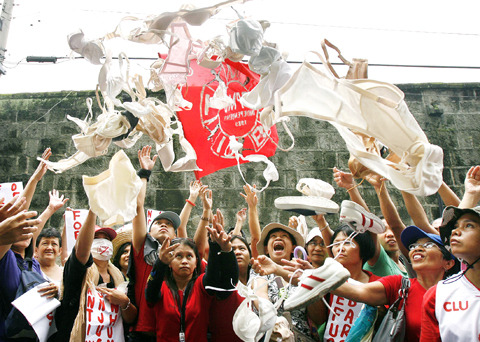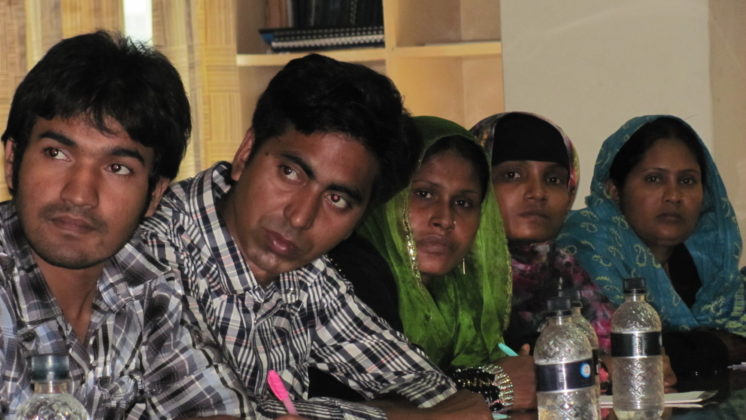The Procedures for National Contact Points (NCPs) in the OECD Guidelines require NCPs to be transparent and also to encourage complaint parties to be transparent.
 Photo: Displaced workers of Triumph International Philippines at protest
Photo: Displaced workers of Triumph International Philippines at protestQuick jump:
Communication by NCPs
Transparency between parties
Transparency toward the public
Public campaigning during cases
Communication before filing a complaint
Communication at the time of filing
Communication after the complaint has been filed
Communication by NCPs
Transparency is a core criterion for NCPs, including with respect to the complaint process. The NCP’s rules of procedure should be publicly available on its website. The NCP should regularly and promptly communicate with parties about the status of the complaint, including reasonable delays to timelines and the publication of the initial assessment, final statement, and follow-up statement. Importantly, the Procedures for NCPs in the OECD Guidelines require NCPs to publish the final and follow-up statements, not their initial assessments. OECD Watch’s evaluations of NCP effectiveness analyse individual NCPs’ communication practices.
Contact us if you are concerned about an NCP’s communication practices.
Transparency between parties
NCPs are expected to ensure transparency between the parties in the complaint process generally, including by sharing all relevant facts, arguments, and documents submitted by each party. NCPs’ statements should be based only on information seen by both parties, and parties should also have an opportunity to comment on draft statements. NCPs should ensure that complainants representing larger communities can communicate freely with their constituents about the complaint proceedings and discussions.
Transparency toward the public
NCPs should ensure transparency toward the public regarding individual complaints, though as a general rule, the following information should be kept confidential:
- The identity of individuals involved in a case, for security/privacy reasons,
- The contents of discussions and documents shared during the initial assessment, mediation, and final assessment stages, unless these are already in the public sphere and
- Business information that truly constitutes a trade secret.
Public campaigning during cases
Many civil society complainants want to know if they can continue campaigning about complaints after they are filed. This is because many NCPs seek to restrict campaigning activities.
- Some NCPs believe that public campaigning during a complaint may reduce a company’s willingness to engage in the complaint process. However, in our experience, campaigning can help correct a power imbalance against complainants by incentivising the company to engage to protect its reputation.
- Some NCPs see campaigning during a complaint as a breach of confidentiality and may dismiss a complaint if complainants communicate anything publicly about it. This is beyond the guidance NCPs have received from the OECD. We believe campaigning can be done while maintaining confidentiality over those aspects of the process that should be confidential.
- Some NCPs see campaigning during a complaint as a breach of good faith by the complainants. To counter this erroneous view, we encourage complainants to ensure their campaign materials:
- Do not incorrectly present or exaggerate the procedural stages of the complaint or the statements or authorities of the NCP.
- Emphasise the complainants’ good faith commitment to resolving the claims through the NCP’s mediation services.
Under the Procedures of the OECD Guidelines, campaigning that respects confidentiality requirements is allowed. Complainants must decide for themselves whether and how to proceed with campaigning in light of an NCP’s transparency or confidentiality requirements and the expected response of the company.
- In some cases, less or more narrowly targeted campaigning may build confidence between the parties and encourage constructive dialogue – provided the company still acts in good faith to resolve the issues and the NCP adheres to the timeframe and procedures.
- In other cases, broader or more campaigning may be necessary to encourage the company(ies) and relevant governments to take the claims and complaint process more seriously.
Below are some general guidelines for communication at different stages of the complaint process:
Communication before filing a complaint
Prior to filing a complaint, no rules govern communication by complainants about a situation, company, or potential NCP complaint.
Communication at the time of filing
At the time of filing, the general rule is transparency. Many NGOs publish a press release upon filing their complaint to raise public awareness, and many publish the complaint text itself. This may cause concern to the particular NCP to which you are filing, and some NCPs prohibit the publication of complaints. It is best to check the NCP’s rules on confidentiality and transparency before filing to see what constraints apply. OECD Watch recommends discussing any concerns or requests with the NCP and contacting us for support if you have questions or concerns.
Communication after the complaint has been filed
After the case has been filed, including during the mediation, final statement, and follow-up stages, the general rule is the transparency of the process along the way and final outcomes, but confidentiality of the content of discussions and non-public documents disclosed and any other matters agreed to be kept confidential. During the entire time the complaint is being handled by the NCP:
- Complainants should not publicly disclose information – including correspondence, documents, or opinions – that is learned or exchanged during the process unless it is already in the public sphere. This helps NCPs encourage both parties to engage fully and openly in the process.
- Complainants may publicly disclose information about purely procedural aspects of the case, such as whether or not the company responds to the allegations or NCP’s follow-up (though not the content of the company’s response), whether meetings between the parties are being organised or have taken place (though not the content of the meetings), and if mediation has begun/ended.
Complainants are free to publish their own statement alongside the NCP’s own final statement and follow-up statement.

